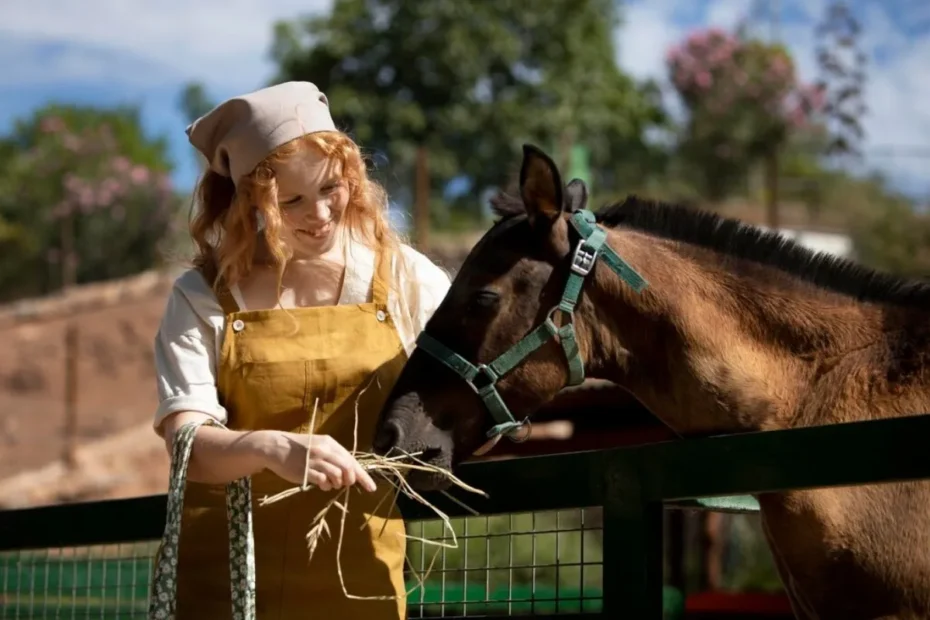The nutritional needs of pregnant mares are crucial for the proper development of foals. Mare health during pregnancy directly affects the health of the newborn foal.
In equine nutrition, the dietary requirements of pregnant mares must be carefully met. This ensures the well-being of both mare and foal.
Let’s dive into the essential factors that influence the nutritional needs of pregnant mares.
Understanding the Nutritional Needs of Pregnant Mares
Pregnant mares have heightened nutritional needs, and their diet must support both their health and the developing foal. These nutritional needs vary depending on the stage of pregnancy, as early and late gestation periods have different requirements. Understanding these varying needs is crucial for providing optimal care.
Providing the right balance of forage, supplements, vitamins, and minerals is essential. A diet rich in high-quality forage ensures a steady supply of necessary nutrients, while supplements can address specific deficiencies. Vitamins and minerals must be carefully balanced to support both the mare and the foal’s development.
Ensuring that pregnant mares receive proper nutrition throughout their gestation period helps prevent complications and promotes the overall health of both the mare and foal. Regular consultations with a veterinarian and tailored dietary plans can help meet these nutritional demands, leading to successful pregnancies and healthy foals.
The Importance of Forage
Forage, such as hay and pasture, forms the foundation of a pregnant mare’s diet. It provides necessary fiber and nutrients.
High-quality forage ensures proper digestion and nutrient absorption. It also helps maintain a healthy weight.
During late gestation, the foal’s nutrient demands increase. The mare’s intake of forage should be closely monitored.
Types of Forage Suitable for Pregnant Mares
Different types of forage can support nutritional needs, including:
- Legume hay (alfalfa): High in protein and calcium
- Grass hay: Provides fiber and balanced energy
- Pasture: Offers variety and essential nutrients
Supplements for Pregnant Mares
In addition to forage, supplements can address specific needs. They ensure no nutrient deficiencies occur.
Common supplements for pregnant mares include:
- Calcium and phosphorus: Important for bone development
- Omega-3 fatty acids: Support inflammation control and fetal brain development
- Probiotics: Aid digestion and nutrient absorption
Consultation with a veterinarian is essential to determine the appropriate supplements.
Balancing Vitamins and Minerals
Understanding the balance of vitamins and minerals is crucial for the health of pregnant mares. Vitamin deficiencies can negatively impact the mare and foal during gestation, so adequate levels are necessary. Ensuring that the mare receives the right vitamins supports both her health and the proper development of the foal.
Mineral imbalances can lead to developmental issues in foals, so proper supplementation is key. Maintaining the right balance of minerals helps in preventing these problems and promotes healthy growth. Regular monitoring and adjustments to the diet ensure that the mare receives all the essential nutrients.
By focusing on the balance of vitamins and minerals, horse owners can provide the best care for pregnant mares. This approach helps prevent deficiencies and imbalances, supporting a healthy pregnancy and the optimal development of the foal. Regular consultation with a veterinarian and careful dietary planning are essential for achieving this balance.
Critical Vitamins
Several vitamins play vital roles in equine nutrition:
- Vitamin A: Essential for vision and immune function
- Vitamin D: Supports calcium absorption and bone health
- Vitamin E: Acts as an antioxidant, supporting tissue health
A balanced diet typically meets these requirements. However, supplementation may be needed in certain cases.
Key Minerals
Minerals are equally important for pregnant mares:
- Calcium: Crucial for bone development
- Phosphorus: Works with calcium for bone health
- Iron: Supports red blood cell production
Proper mineral balance is essential. It ensures a healthy gestation and foal development.
Monitoring Mare Health During Pregnancy
Regular monitoring of the mare’s health is vital, as it helps in adjusting their nutrition as needed. Weight gain should be tracked to avoid obesity or undernourishment, both of which can cause complications. Keeping a close eye on the mare’s weight ensures that her nutritional needs are being met appropriately.
Blood tests and veterinary check-ups can detect any deficiencies or health issues early. Regular health assessments allow for timely intervention, preventing potential problems from becoming severe. This proactive approach helps maintain the mare’s overall health and ensures the well-being of the developing foal.
By consistently monitoring health and nutrition, horse owners can provide the best care for pregnant mares. This diligence supports a healthy pregnancy, reduces risks, and contributes to the successful delivery of a strong, healthy foal. Regular adjustments to the diet, based on veterinary advice and health indicators, are essential for optimal care.
Adjusting Diet Throughout Gestation
As pregnancy progresses, nutritional needs change, so the diet must be adjusted accordingly. Early gestation requires a different diet compared to late gestation, as nutrient intake must align with the foal’s growth stages. Ensuring that these dietary adjustments are made is crucial for the health of both the mare and the foal.
Consulting with a veterinarian ensures the mare receives appropriate nutrition as pregnancy advances. Regular check-ups and dietary evaluations help tailor the feeding plan to meet the changing needs throughout the gestation period. This proactive approach supports optimal development and well-being.
Adapting the diet to the specific stages of pregnancy helps in providing the necessary nutrients at the right times. By staying informed and working closely with a veterinarian, horse owners can ensure the mare’s health and the foal’s proper growth, leading to a successful pregnancy and a strong, healthy foal.
Ensuring Hydration
Hydration is a critical component of a pregnant mare’s health, as adequate water intake supports overall well-being. Water aids in digestion, nutrient absorption, and regulating body temperature. Ensuring that the mare has access to fresh water at all times is essential for meeting her hydration needs.
Proper hydration helps in maintaining the mare’s health and the development of the foal. It ensures that the digestive system functions smoothly, preventing issues like colic and dehydration. Regular water intake also supports the absorption of essential nutrients, promoting better health for both the mare and foal.
Providing fresh water at all times helps meet the mare’s hydration needs, especially during pregnancy when her requirements may increase. This simple yet crucial practice ensures that the mare remains healthy and well-hydrated, contributing to a successful pregnancy and a healthy foal. Regular monitoring of water consumption can help identify any issues early, allowing for prompt intervention and care.
Common Health Issues
Pregnant mares may face specific health challenges, so awareness and proactive management are key. Potential issues include laminitis, colic, and metabolic disorders, all of which can impact both the mare and foal. Being vigilant about these conditions helps in taking timely action to prevent complications.
Preventive measures include proper diet, regular exercise, and veterinary care. Ensuring the mare receives a balanced diet tailored to her needs helps in managing weight and avoiding nutritional deficiencies. Regular exercise supports overall health and reduces the risk of metabolic disorders, while routine veterinary check-ups allow for early detection and management of potential issues.
By focusing on these preventive strategies, horse owners can significantly improve the health and well-being of pregnant mares and their foals. This comprehensive approach ensures that both the mare and foal have the best possible outcomes, leading to a healthier pregnancy and a stronger start for the foal.
Ensuring a Healthy Foal
The ultimate goal of managing the nutritional needs of pregnant mares is to support healthy foal development. Nutrient transfer from mare to foal during pregnancy is critical, and a well-balanced diet ensures optimal growth. Ensuring that the mare receives the right balance of nutrients supports the developing foal’s health and prepares it for a strong start in life.
Monitoring foal development in utero helps in making necessary dietary adjustments. Regular check-ups and ultrasounds allow veterinarians to assess the foal’s growth and make recommendations for the mare’s diet. This proactive approach ensures that any nutritional deficiencies are addressed promptly, promoting better outcomes for both mare and foal.
By focusing on the mare’s nutrition and monitoring foal development, horse owners can ensure the best possible conditions for a healthy pregnancy. This comprehensive care strategy supports the mare’s well-being and fosters optimal growth and development for the foal, leading to a healthier and more robust horse.
Post-Birth Considerations
After the foal is born, the mare’s nutritional needs continue to be important. Lactation increases nutrient demands, so a balanced diet supports milk production and quality. Ensuring the mare receives adequate nutrition helps maintain her health and provides the foal with the essential nutrients needed for growth.
Continued veterinary care ensures both mare and foal remain healthy post-birth. Regular check-ups allow for monitoring of their condition and timely adjustments to their diet and care. This ongoing attention is crucial for identifying and addressing any health issues that may arise.
Providing a balanced diet during lactation, along with consistent veterinary care, helps promote the long-term health of both the mare and foal. This comprehensive approach ensures that the nutritional and health needs of both are met, leading to stronger, healthier horses.
Long-term Health of Mare and Foal
Long-term health is influenced by proper nutrition during pregnancy, setting the foundation for future well-being. Early life nutrition impacts growth, immunity, and performance, so a strong start benefits the foal throughout its life. Ensuring that mares receive balanced nutrition during pregnancy is crucial for the health of both the mare and the foal.
Mares that receive balanced nutrition are more likely to have successful pregnancies in the future, with better outcomes for both themselves and their offspring. Proper nutritional support helps in the development of a robust immune system, enhancing the foal’s ability to fend off diseases and infections from an early age. Additionally, it ensures optimal growth and development, leading to improved performance and overall health.
By prioritizing balanced nutrition during pregnancy, horse owners can contribute to the long-term health and success of their horses. This proactive approach not only benefits the immediate pregnancy but also sets the stage for healthier future pregnancies and stronger, healthier foals.
Final Thoughts
Providing the right nutrition for pregnant mares is essential for healthy foal development. A balanced diet, including forage, supplements, vitamins, and minerals, supports both mare and foal.
By monitoring mare health and adjusting their diet as needed, you ensure a successful gestation period. Remember, consulting with a veterinarian is crucial for optimal outcomes.
For more information on equine nutrition and mare care, subscribe to our newsletter and stay informed about the latest in horse health management.
Frequently Asked Questions
What is the most important aspect of a pregnant mare’s diet?
High-quality forage is the foundation of a pregnant mare’s diet. It provides essential fiber and nutrients for both the mare and the developing foal.
Do pregnant mares need supplements?
Yes, supplements can address specific nutritional needs such as calcium, phosphorus, and omega-3 fatty acids. Consult a veterinarian to determine the appropriate supplements.
How often should a pregnant mare’s health be monitored?
Regular monitoring, including weight tracking and veterinary check-ups, is essential throughout pregnancy. It helps in adjusting the diet and addressing any health issues promptly.
Are there differences in nutritional needs during early and late gestation?
Yes, nutritional needs vary between early and late gestation. The diet must be adjusted to align with the foal’s growth stages and increased nutrient demands.
How much water should a pregnant mare drink daily?
Adequate hydration is crucial. Ensure the mare has constant access to fresh water, supporting digestion, nutrient absorption, and overall health.

